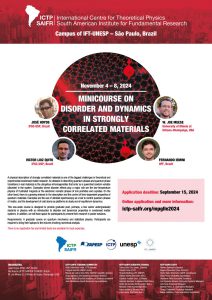Minicourse on disorder and dynamics in strongly correlated materials

November 4-8, 2024
São Paulo, Brazil
IFT-UNESP Auditorium
Zoom Access Data
Meeting ID: 858 2404 8223
Passcode: disorder
Home
A physical description of strongly correlated materials is one of the biggest challenges in theoretical and experimental condensed matter research. An obstacle in describing quantum phases and quantum phase transitions in real materials is the ubiquitous inhomogeneities that enter as a quenched random variable (disorder) in the system. Examples where disorder effects play a major role are the low-temperature physics of frustrated magnets or the electronic nematic phases of iron pnictides and cuprates. On the other hand, there is a growing interest in the description and the control of time-dependent properties of quantum materials. Examples are the use of ultrafast spectroscopy as a tool to control quantum phases of matter, and the development of cold atoms as platforms to study out-of-equilibrium dynamics.
This one-week course is designed to provide graduate (and, perhaps, a few senior undergraduate) students in physics with an introduction to disorder and dynamical properties in condensed matter systems. In addition, we will have space for participants to present their research in poster sessions.
Requirements:
A graduate course on quantum mechanics and statistical physics.
Participants are required to bring their laptops to the lectures involving numerical analysis.
There is no registration fee and limited funds are available for local expenses.
Organizers:
- José Hoyos (IFSC-USP, Brazil)
- Rui Aquino (ICTP-SAIFR/IFT-UNESP, Brazil)
- W. Joe Meese (University of Illinois at Urbana-Champaign, USA)
List of Participants: Updated on November 6, 2024.
Survey: Here
Lecturers
Lecturers:
- José Hoyos (IFSC-USP, Brazil) and W. Joe Meese (University of Illinois at Urbana-Champaign, USA): Phase transitions in disordered quantum systems.
- Victor Luiz Quito (IFSC-USP, Brazil): Floquet engineering quantum systems.
- Fernando Iemini (UFF, Brazil): Dynamics in quantum many-body systems.
New topics can be accommodated if time permits and/or upon request.
Registration
Posters Sessions
- Session 1 (Tuesday, November 5)
- Session 2 (Wednesday, November 6)
- Session 3 (Thursday, November 7)
Participants MUST BRING THE BANNER PRINTED.
For details about the poster presentation please look at the correspondent Additional Information topic.
Program
Minicourse Program: PDF
Videos and Files
- 09:00 - José Hoyos; W. Joe Meese (IFSC-USP, Brazil; University of Illinois at Urbana-Champaign, USA): Phase transitions in disordered quantum systems - Class 1
- 11:00 - Victor Luiz Quito (IFSC-USP, Brazil): Floquet engineering quantum systems - Class 1
- 14:00 - Fernando Iemini (UFF, Brazil): Dynamics in quantum many-body systems - Class 1
-
09:00 - Victor Luiz Quito (IFSC-USP, Brazil):
Floquet engineering quantum systems - Class 2
- 11:00 - Fernando Iemini (UFF, Brazil): Dynamics in quantum many-body systems - Class 2
-
14:00 - José Hoyos; W. Joe Meese (IFSC-USP, Brazil; University of Illinois at Urbana-Champaign, USA):
Phase transitions in disordered quantum systems - Class 2
- 09:00 - Fernando Iemini (UFF, Brazil): Dynamics in quantum many-body systems - Class 3
-
11:00 - José Hoyos; W. Joe Meese (IFSC-USP, Brazil; University of Illinois at Urbana-Champaign, USA):
Phase transitions in disordered quantum systems - Class 3
- 14:00 - José Hoyos (IFSC-USP): From disorder to order and back again
-
15:30 - Victor Luiz Quito (IFSC-USP, Brazil):
Floquet engineering quantum systems - Class 3
-
09:00 - Victor Luiz Quito (IFSC-USP, Brazil):
Floquet engineering quantum systems - Class 4
-
11:00 - José Hoyos; W. Joe Meese (IFSC-USP, Brazil; University of Illinois at Urbana-Champaign, USA):
Phase transitions in disordered quantum systems - Class 4
- 14:00 - Fernando Iemini (UFF, Brazil): Dynamics in quantum many-body systems - Class 4
- 09:00 - Fernando Iemini (UFF, Brazil): Dynamics in quantum many-body systems - Class 5
-
11:00 - Victor Luiz Quito (IFSC-USP, Brazil):
Floquet engineering quantum systems - Class 5
-
14:00 - José Hoyos; W. Joe Meese (IFSC-USP, Brazil; University of Illinois at Urbana-Champaign, USA):
Phase transitions in disordered quantum systems - Class 5
asdasdasd
Photos
Additional Information
How to reach the Institute: The school will be held at ICTP South American Institute, located at IFT-UNESP, which is across the street from a major bus and subway terminal (Terminal Barra Funda). The address which is closer to the entrance of the IFT-UNESP building is R. Jornalista Aloysio Biondi, 120 – Barra Funda, São Paulo. The easiest way to reach us is by subway or bus, please find instructions here.
Poster presentation: Participants who are presenting a poster MUST BRING A PRINTED BANNER . The banner size should be at most 1 m (width) x 1,5 m (length). We do not accept A4 or A3 paper.

